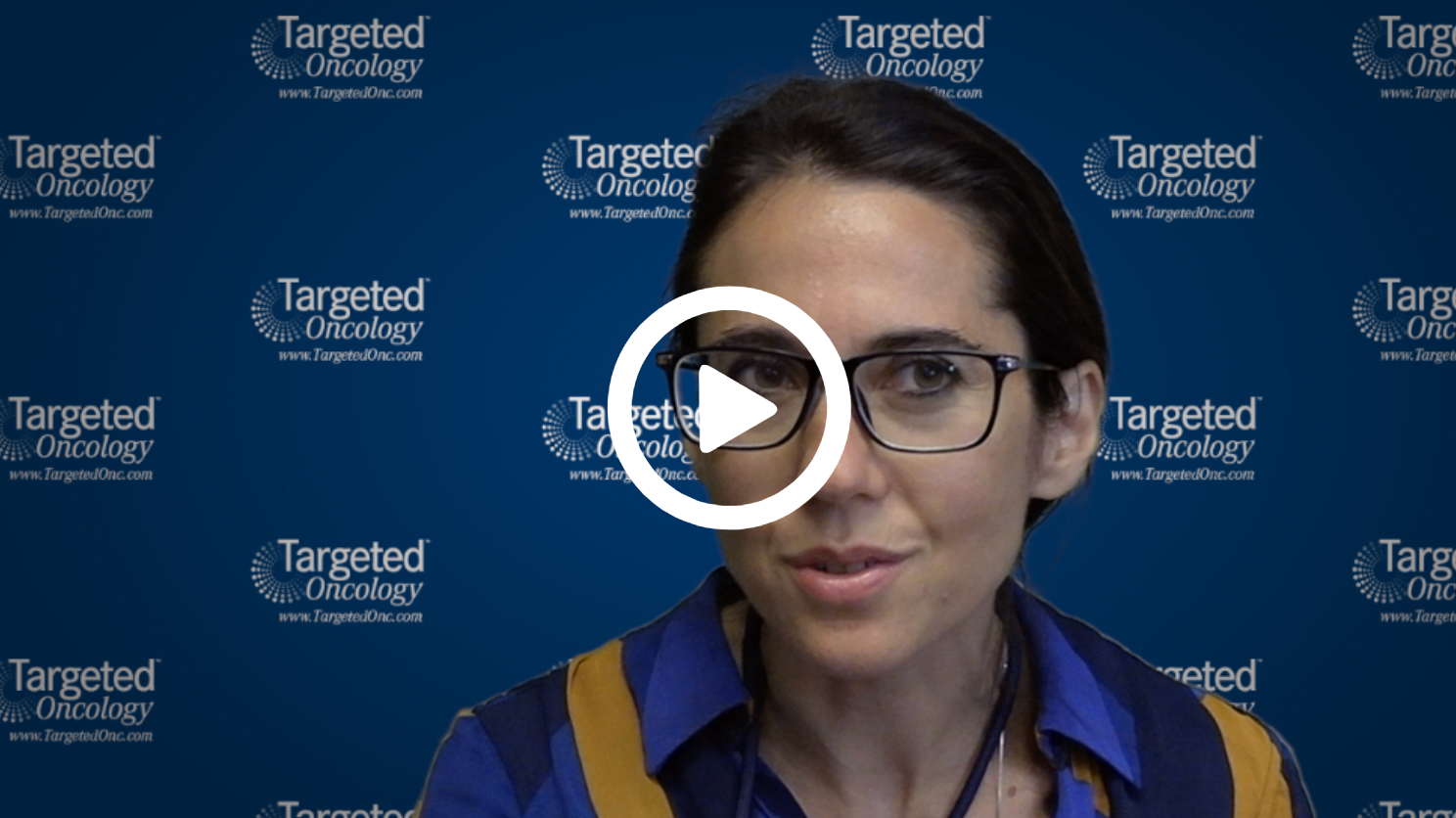Clinical Research Drives Advances in Ovarian Cancer
The treatment of platinum-resistant ovarian cancer is challenging, with limited therapeutic options. Antibody-drug conjugates as single agents or in combinations are showing promise for these patients.
John Diaz, MD

The majority of patients with advanced ovarian cancer will have an initial response to platinum-based chemotherapy and enter an initial remission. Despite this initial response, most women will experience a recurrence of their disease and ultimately develop resistance to platinum during their treatment.
The treatment of platinum-resistant ovarian cancer (PROC) is challenging, with limited therapeutic options. The ideal treatment is unknown, and patients are encouraged to enroll on clinical trials when available. A new class of drugs, antibody-drug conguates (ADCs) have emerged with promising early results.
ADCs have the ability to deliver cytotoxic drugs to cancer cells expressing select antigens using specific monoclonal antibodies. ADCs are comprised of three essential components: an antibody directed against a specific cancer antigen, the cytotoxic payload, and a connecting linker. The antibody used is specific to antigen expression on cancer cell surface. This allows targeting of an over-expressed antigen specific to the disease. The linker connects the antibody to the payload and is susceptible to release the cytotoxic compound in the lysosomes after endocytosis.1 The payload has greater potency as compared to the standard anti-cancer cytotoxics.2 The payloads are stable during infusion and separate from the antibody once internalized into cancer cells. Several anti-tumor agents have been used as payloads in ADCs. The therapeutic impact and the mechanisms of action of ADCs also include bystander killing of the surrounding cancer cells.3 Over that last 2 years, the FDA has approved 6 additional ADCs, including 3 approved for the treatment of solid tumors.
Several ADCs have been investigated for the treatment of PROC. One of the most common antigens targeted is the Folate receptor alpha (FolRα). FolRα is a cell-surface glycoprotein that is overexpressed in multiple cancer types, including epithelial ovarian cancer (EOC). High FolRα expression is detected by immunohistochemistry (IHC) in > 80% of ovarian cancers, with expression appearing to increase with progression of the disease.4 Mirvetuximab soravtansine (IMGN853) is the first developed humanized FRα-binding antibody based ADC. It has initially studied in a phase I trial of 27 relapsed EOC patients including 20 patients with platinum-resistant disease with a minimum 25% positive FRα tumor. They were treated with 6 mg/kg of mirvetuximab soravtansine every three weeks.5 An objective response rate (ORR) of 22 % was observed with two complete responses and four partial responses. Evaluation of the FRα expression cohort demonstrated an ORR of 31%.5 These findings were confirmed in a parallel phase 1 trial evaluating the same dosing and regimen for patients with PROC, primary peritoneal, or fallopian tube FRα-positive cancers.6
FORWARD I (GOG3011, NCT02631876) was a phase 3 randomized controlled trial (2:1 ratio) that compared Q3W mirvetuximab soravtansine (6 mg/kg;) versus investigator’s choice chemotherapy (peglated liposomal doxorubicin, paclitaxel, or topotecan;) in PROC patients stratified by FRα biomarker expression.7 The median progression-free survival (PFS) in the intention to treat population was 4.1 versus 4.4 for the ADC arm and chemotherapy respectively (HR, 0.981; P =.897). While the study did not meet the primary endpoint, it confirmed the favorable tolerability and efficacy in the high FRα cohort. Based on these encouraging results mirvetuximab soravtansine is being evaluated in 2 phase 3 trials.
MIRASOL is a phase 3 (NCT04209855) that is currently recruiting PROC patients to receive mirvetuximab soravtansine (6 mg/kg, Q3W) or investigator’s choice of chemotherapy in a randomized fashion. Enrolled participants should have a high tumor expression of FRα (≥ 75%) based on the Ventana FOLR1 (FOLR 1-2 .1) CDx immunohistochemistry assay.8 The expected completion November 2022.
SORAYA (NCT04296890) is another phase 3 trial investigating the efficacy of mirvetuximab soravtansine (6 mg/kg, Q3W) in high-grade serous PROC patients with highly expressed FolRα as defined by the previous IHC-based assay. Its primary objective is ORR and is expected to provide the early results in July 2022. Mirvetuximab soravtansine has also been evaluated in combination therapy. FORWARD II trial (NCT02606305) evaluated the combination of mirvetuximab soravtansine 6 mg/ kg adjusted per ideal body weight combined to bevacizumab (15 mg/kg) Q3W in patients with positive FRα.9 The updated results were presented at American Society of Clinical Oncology in 2020 demonstrated a 59 % ORR in high FolR-α expressing tumor PROC-patients and 69 % in platinum-sensitive patients.10
Another novel FRα-targeting ADC is STRO-002, which induces immunogenic cell death and contains the tubulin-targeting 3-aminophenyl hemiasterlin warhead SC209, a potent cytotoxin that is a weak substrate for P-gp. A phase 1, open-label study was performed in patients with advanced, platinum resistant or refractory EOC. FRα expression was not required for eligibility and retrospective analysis of FRα expression in archival tumor tissue is ongoing. Thirty-nine patients were treated at 9 dose levels (0.5 to 6.4 mg/kg). Median number of prior systemic therapies was 6 (range 2-11). 86% of treatment emergent adverse events (AEs) were grade 1-2. The most common treatment related grade 3 and 4 AEs were reversible neutrophil count decreased (36%) and neutropenia (33%), grade 3 arthralgia (12.8%) and neuropathy (7.7%). Objective responses were seen in 10/31 patients, which included 1 complete response, 4 confirmed partial responses (PR), and 5 unconfirmed PRs (imaging studies under review in 1 patient with uPR). The disease control rate was 74% at ≥ 12 weeks and 61% at ≥ 16 weeks. Five patients remain on treatment with 3 ongoing at > 74 weeks. FRα-expression results are available in 14. Twelve of 13 patients with H-scores of ≥ 105 achieved disease control with PR or SD.11 A randomized expansion cohort comparing STRO-002 at 4.3 mg/kg versus 5.2 mg/kg dose levels in less heavily pretreated EOC patients is ongoing. The combination of this novel ADCs with other therapies is being evaluated.
PROC remains a challenging disease with limited therapeutic options. ADCS have demonstrated efficacy and tolerability in this setting. ADCs alone or in combination with traditional therapies may provide improved outcomes for patients suffering from PROC.
REFERENCES:
1. Jun L, Jiang F, u A, et al. Linkers having a crucial role in antibody-drug conjugates. Int J Mol Sci. 2016;17(4):561. doi: 10.3390/ijms17040561.
2. Collins DM, Bossenmaier B, Kollmorgen G, et al. Acquired resistance to antibody-drug conjugates. Cancers (Basel). 2019;11(3):394. doi: 10.3390/cancers11030394
3. Staudacher AH and Brown MP. Antibody drug conjugates and bystander killing: is antigen-dependent internalisation required? Br J Cancer. 2017;117(12):1736-1742. doi: 10.1038/bjc.2017.367
4. Köbel M, Madore J, Ramus SJ, et al. Evidence for a time-dependent association between FOLR1 expression and survival from ovarian carcinoma: implications for clinical testing. An Ovarian Tumour Tissue Analysis consortium study. Br J Cancer. 2014;111(12):2297-2307. doi: 10.1038/bjc.2014.567
5. Martin LP, Konner JA, Moore KN, et al. Characterization of folate receptor alpha (FRα) expression in archival tumor and biopsy samples from relapsed epithelial ovarian cancer patients: A phase I expansion study of the FRα-targeting antibody-drug conjugate mirvetuximab soravtansine. Gynecol Oncol. 2017;147(2):402-407. doi: 0.1016/j.ygyno.2017.08.015
6. Moore KN, Martin LP, O’Malley DM, et al. Safety and activity of mirvetuximab soravtansine (IMGN853), a folate receptor alpha-targeting antibody-drug conjugate, in platinum-resistant ovarian, fallopian tube, or primary peritoneal cancer: a phase I expansion study. J Clin Oncol. 2017;35(10):1112-1118. doi: 10.1200/JCO.2016.69.9538
7. Moore K, Oza A,, Colombo N, et al. FORWARD I (GOG 3011): A phase III study of mirvetuximab soravtansine, a folate receptor alpha (FRa)-targeting antibody-drug conjugate (ADC), versus chemotherapy in patients (pts) with platinum-resistant ovarian cancer (PROC). Ann Oncol. 2019l30(suppl 5):V403. doi: 10.1093/annonc/mdz250
8. Moore KN, Gorp TV, Wang J, et al. MIRASOL (GOG 3045/ENGOT OV-55): A randomized, open-label, phase III study of mirvetuximab soravtansine versus investigator’s choice of chemotherapy in advanced high-grade epithelial ovarian, primary peritoneal, or fallopian tube cancers with high folate-alpha (FRα) expression. J Clin Oncol. 2020;38 (suppl 15). doi: 10.1200/JCO.2020.38.15_suppl.TPS6103
9. O’Malley DM, Matulonis UA, Birrer MJ, et al. Phase Ib study of mirvetuximab soravtansine, a folate receptor alpha (FRα)-targeting antibody-drug conjugate (ADC), in combination with bevacizumab in patients with platinum-resistant ovarian cancer. Gynecol Oncol. 2020;157(2):379-385. doi: 10.1016/j.ygyno.2020.01.037
10. Fowler M. Mirvetuximab soravtansine combination yields encouraging response rates in ovarian cancer. Oncology (Williston Park). 2020;34(7):250. PMID: 32674207
11. Naumann RW, Braiteh FS, Martin LP, et al. Phase 1 dose-escalation study of STRO-002, an antifolate receptor alpha (FRα) antibody drug conjugate (ADC), in patients with advanced, progressive platinum-resistant/refractory epithelial ovarian cancer (EOC). J Clin Oncol. 2021;39(suppl 15): 5550. doi 0.1200/JCO.2021.39.15_suppl.555









